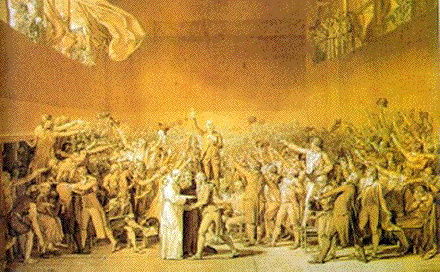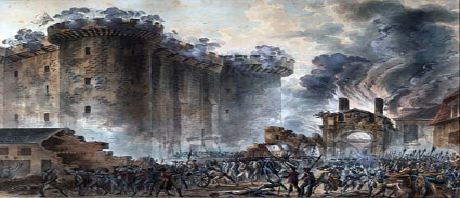![]()
![]()
The Outbreak
of the Revolution
By 1787 the French government
was heavily in debt. Faced with a serious national bankruptcy, King Louis
XVI called a meeting of notables consisting of the nobility and higher
clergy. They were asked to agree to new taxes. But they refused; instead
they demanded that the King would have to call a meeting of the Estates
General. This was an old form of parliament that had not met for over 150
years. The Estates General consisted of three estates the clergy,
the nobles and the Third Estate, which stood for the common people but
in practice represented the middle class.
Tennis Court
Oath
 When
the Estates General met in 1789 the King had expected that it would vote
taxes to the government to solve the problem of bankruptcy. But the meetings
were now dominated by the representatives of the middle class. The Third
Estate decided to reform the whole system of government and to sweep away
the privileges of the other two estates. The representatives from the Third
Estate demanded that the King should rule through a parliament that would
meet regularly. They also declared themselves to be the National Assembly,
speaking for all the French people. Being locked out of their meeting hall,
they met at a nearby tennis court at Versailles in June 1789. Inside the
tennis court, Bailly, one of the main leaders of the Third Estate, stood
on a table and voiced the ideas of Mounier, another leader. This proposal
voiced by Bailly was that the Third Estate would not leave Versailles until
there was a constitution which they agreed upon. This idea of Mounier's
was taken in favor of a more radical reform plan proposed by Sieyes. Of
the 577members, all but one accepted this oath. This oath, which would
change Mother France forever, was known as the Tennis Court Oath.
When
the Estates General met in 1789 the King had expected that it would vote
taxes to the government to solve the problem of bankruptcy. But the meetings
were now dominated by the representatives of the middle class. The Third
Estate decided to reform the whole system of government and to sweep away
the privileges of the other two estates. The representatives from the Third
Estate demanded that the King should rule through a parliament that would
meet regularly. They also declared themselves to be the National Assembly,
speaking for all the French people. Being locked out of their meeting hall,
they met at a nearby tennis court at Versailles in June 1789. Inside the
tennis court, Bailly, one of the main leaders of the Third Estate, stood
on a table and voiced the ideas of Mounier, another leader. This proposal
voiced by Bailly was that the Third Estate would not leave Versailles until
there was a constitution which they agreed upon. This idea of Mounier's
was taken in favor of a more radical reform plan proposed by Sieyes. Of
the 577members, all but one accepted this oath. This oath, which would
change Mother France forever, was known as the Tennis Court Oath.
The Storming
of the Bastille
 The
harvest of 1788 had failed and famine was likely to break out at any time.
The streets of Paris were crowded with hungry people who looked to the
Assembly for help. They soon became impatient. On 14 July 1789 the Paris
mob rose and stormed the Bastille, an ancient fortress prison. It was captured
and this day, Bastille Day, has been celebrated ever since as the National
Day of France.
The
harvest of 1788 had failed and famine was likely to break out at any time.
The streets of Paris were crowded with hungry people who looked to the
Assembly for help. They soon became impatient. On 14 July 1789 the Paris
mob rose and stormed the Bastille, an ancient fortress prison. It was captured
and this day, Bastille Day, has been celebrated ever since as the National
Day of France.
To many Frenchmen at that time, the fall of the Bastille — the symbol of absolutism — was of fundamental importance. It meant the end of royal tyranny and the birth of liberty. The fall of the Bastille also forced the basically middle-class National Assembly to join with the people to prevent counter-attack by the nobles. Following the fall of the Bastille, a wave of violence spread over the whole country and nobles’ lands was seized.
Reforms
The National Assembly made
a sharp break with the past and carried out many reforms. In August 1789
it drew up the Declaration of the Rights of Man. This Declaration was influenced
by the ideas of 18th century Enlightenment. The intention was to have order,
reason and efficiency. It proclaimed the principles of Liberty, Equality
and Fraternity. Among other important ideas the Declaration stated that
'Men are born free and equal in rights'. The Declaration influenced many
European liberals for the next half-century.
The National Assembly abolished the feudal order and the nobles lost their titles and privileges. Church lands were taken over and the government undertook to pay the clergy like civil servants.
Revolutionary
Wars
During the summer of 1791
the King tried to escape abroad with his family. At first all went well,
but they were recognized and were taken back to Paris.
The European countries felt uneasy about France. It seemed as though the French King was in danger from the revolutionaries. Austria was particularly concerned about the French Queen, Marie Antoinette, for she had been an Austrian princess before her marriage. In August 1791 both Austria and Prussia declared their intention to interfere in France. The French naturally became angry, as any people would feel when outsiders try to interfere. Many revolutionaries also welcomed the chance to go to war. In April 1792 France declared war on Austria and Prussia. Other nations began to prepare for war. In February 1793 France also declared war on Britain, Spain and the Netherlands.
The Republic
In September 1792 a new assembly,
the National Convention, abolished the monarchy and set up a republic.
The Convention declared that the King had been disloyal to the country.
In January 1793 he was put to death on the guillotine. The Queen followed
him some months later.

The Reign of
Terror
The execution of Louis XVI
was followed by the Reign of Terror that lasted from 1793 to 1794. Risings
broke out in various parts of the country. In April 1793 the National Convention
set up the Committee of Public Safety to stamp out the risings. The Committee
was headed by Maximilien Robespierre, the leader of the extreme revolutionaries,
the Jacobins. Soon quarrels broke out between the moderate Republicans
known as the Girondins, and the Jacondins and any ‘ enemies of the revolution’
were guillotined. During the Reign of Terror many thousands of people were
killed in this way. In the end Robespierre himself was overthrown and executed
in July 1794. Consequently, the Reign of Terror slowly drew to an end.
The Directory
In 1795 the National Convention
drew up a new constitution. Under the new constitution, France was to be
ruled by a committee of five, known as the Directory. But the new government
became unpopular and the Paris mob attacked the Directory. The crowd was
dispersed by the army under the command of General Napoleon Bonaparte.
In 1799 Napoleon seized power and overthrew the Directory. He set up a
new form of government called the Consulate. He himself became the First
Consul and held most of the power.
The Achievements
of the French Revolution
The French Revolution brought
about many changes in the country. It ended the absolute monarchy and the
privileges of the nobles and the clergy. Taxation was made fairer, and
unjust laws were swept away. All men became equal in the eyes of the law.
The French Revolution established the supremacy of the middle class in
towns. In the countryside it gave the peasants a greater share over the
land.
Unlike the American Revolution, the French Revolution challenged the old order outside its boundaries. Many European nations went to war with France. During these wars, revolutionary ideas were carried through the length and breadth of Europe. The French cry of ‘Liberty, Equality and Fraternity’was heard in many lands. No place was quite the same thereafter. During the next half-century revolutions spread like wildfire throughout Europe.
![]()